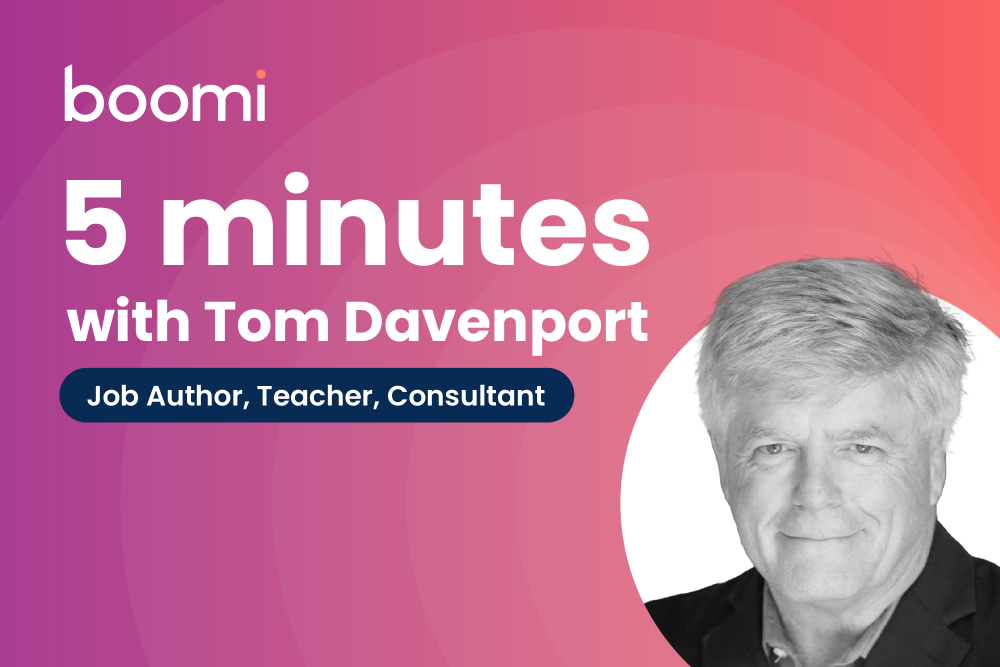Boomi highlights leading thought leaders, the business trends they see, and their work. And their hot takes on pizza integrations, too.
For many of us, the Artificial Intelligence (AI) revolution exploded onto the scene in November 2022 with the arrival of ChatGPT. But not for Tom Davenport. He has been thinking about the potential of AI for decades.
Davenport has written five books on the topic, including co-authoring the recent “All in On AI: How Smart Companies Win Big with Artificial Intelligence.”
His fascination with AI’s potential dates back to the late 1980s, when he worked for a consulting firm that spun off an AI company.
“It was quite interesting, but it didn’t amount to much because it was too hard to create a rules-based system back then,” Davenport said. “There have been all these springs and winters with AI over the years. As someone who has always been involved with analytics and data, it’s exciting to see it come roaring back.”
If Davenport were a baseball player, it would be hard to fit all his highlights on the back of a trading card. President’s Distinguished Professor of Information Technology and Management at Babson College. Research fellow at the MIT Initiative on the Digital Economy. Co-founder of the International Institute for Analytics. Senior advisor in the Deloitte Analytics and AI Practice.
And in addition to the five AI-related books, he’s the author or editor of over 15 more. Let’s just say writer’s block isn’t an issue for him.
He focuses on information technology, how organizations can take advantage of data, and what every business can learn from the aggressive, early adopters – like those leading the AI charge. He’s also the keynote speaker at the Boomi World Tour 2023 event series kickoff in Silicon Valley.
Davenport took time to discuss what it means to be “all in” on AI, the rise of citizen development, and his journey from studying sociology to becoming a leading voice in business. Here are lightly edited portions of our conversation.
You wear many different hats. How do you explain to people what you do?
Tom Davenport: I say that I teach, do research and writing, and work with companies to help them improve. When my focus was on analytics and big data, that would end the conversation with most people right there. But now that everything I do is pretty much AI-related stuff, people are much more interested in talking about that. It’s just too bad that my parents are no longer here because they might finally understand what I do.
How does someone with a sociology background become an authority on getting the most from new technologies and data?
Tom Davenport: Sociologists analyze data. Helping them do that is how I paid my way through graduate school, and I even had a job briefly as head of end-user computing at Harvard Computing Center. When I started to write sociology papers, I realized there might be five other sociologists in the world who were interested in it. So, I started consulting. I care about how people use information and technology. Maybe that’s what makes me a little different. I’m interested in how people use technology, not just the technology itself.
What are examples of that?
Tom Davenport: I’ve written two books on AI and people. An early chapter in our new book is “The Human Side.” When we’re talking about new technologies, it’s important to look at the impact on people. I’ve always felt strongly about AI augmenting humans rather than automating them. I must confess that generative AI has given me some pause. The thing you have to worry about is similar to automobiles. Do the car jobs come along quickly enough for the people who lose their jobs involving horses? We’ve had really tough times in history, like in all those Dickens novels where people lost their jobs to textile machinery and were gone by the time the new jobs came along. There may be what economists call “dislocation,” which sounds a little bloodless. There will certainly be a lot of new jobs that come about because of AI, but it may take a while.
Do you see yourself as an AI optimist?
Tom Davenport: There are a lot of positive things that come out of this. Better healthcare is one example. Great things will eventually occur in that regard. We’re already seeing AI making companies more efficient and productive. Theoretically, there’s still that idea that we’ll get offered products and services we want. We’ve long been promised personalized ads, and I know that’s only happened once to me. But I think that will become less rare with AI. I’m not too worried about robot overlords killing us all. I’m more worried about deep fakes and politicians being shown to say things that they didn’t actually say, and so on. I’m pretty sure a lot of that’s going to happen.
How would you describe being “all in” on AI?
Tom Davenport: You’re spending a lot on it. You have a lot of smart people who do it. You’re becoming more able to make early and well-informed bets before your competitors do. Google is all in on AI. Boomi is all in on AI. A lot of digital-native companies are. But I’m more interested in the legacy companies – banks, insurance companies, healthcare organizations. That’s really what this new book is about. Legacy companies need to transform what they do. They’ll need to invest heavily to get their data in shape and develop a whole variety of different applications or use cases involving AI. It will make a big difference in business models, which is one of the more exciting things about AI.
How has your focus shifted in recent years from analytics back to AI?
Tom Davenport: I was an analytics person for quite a while, and then I moved to big data, and that’s sort of evolved into AI. It was a natural shift to go into the machine learning side of AI because it’s sort of analytics on steroids. Now, I say generative AI is like analytics on LSD.
By that, do you mean AI “hallucinates” and makes up answers to prompts?
Davenport: Or just not knowing what’s going to come out. Somebody said something quite interesting to me recently. These systems are like something an alien dropped on us, and we don’t quite understand how they work. All we can do is feed them various things and see what comes out the other end. We’re still very much in the dark about how to use them effectively. We don’t really know what we’re up to yet.
What else do you see on the horizon?
Tom Davenport: I’ve written two articles recently about citizen development-related issues, like citizen AI, citizen code generation, citizen automation, citizen data science, and all these things. The world is changing dramatically. Technology is getting much easier to use, and people are getting better at using it. It will make a huge difference in how we think about and structure information technology in organizations.
Because Boomi integrates systems, let’s end with a fun question. What’s your favorite pizza “integration?”
Tom Davenport: It’s not terribly exotic, but I love Italian sausage. I like it with onions and mushrooms. My wife likes to sneak in some olives, even though I don’t really like them. But I guess that makes it healthier.
Up Close With Tom Davenport

Role: Author, teacher, consultant
Home: Splits time between Massachusetts and California
Family: Married, two adult sons
Education: Doctorate and master’s degrees in sociology from Harvard, bachelor’s degree from Trinity University
Career: He might be best known as a prolific writer. “I suppose you could quibble with the quality of my work but not the quantity,” he joked. “That’s never been my problem.”
Fun Fact: “When I was in school in Texas, I won a jalapeno pepper eating contest. I think I ate 18 in 30 seconds and survived.”
A few spots at stops on the Boomi World Tour and Partner Summits are still available. Click here to learn more and register.


 English
English 日本語
日本語